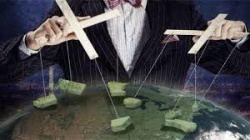Difference between revisions of "Puppet state"
(Stub - exapand needed here) |
m (Text replacement - "|WP=https://" to "|wikipedia=https://") |
||
| (One intermediate revision by the same user not shown) | |||
| Line 1: | Line 1: | ||
{{concept | {{concept | ||
| − | | | + | |wikipedia=https://en.wikipedia.org/wiki/Puppet_state |
|image=puppet state.jpg | |image=puppet state.jpg | ||
}} | }} | ||
| Line 9: | Line 9: | ||
It overlooks ''de facto'' control of client states, and overlooks the importance of economic domination{{example needed}}. | It overlooks ''de facto'' control of client states, and overlooks the importance of economic domination{{example needed}}. | ||
| + | ==Globalisation== | ||
| + | [[Adrian Salbuchi]] has argued that the notion of sovereign independent states organising as they see fit is in fact an illusion, fulfilling the same purpose as [[party politics]] - i.e. as a convenient window dressing to cover over the Machiavellian business of [[deep politics]]. Evidence for this includes: | ||
| + | * the apparent coordination of supposedly independent nation's policies - such as, for example, the creation of a global "[[war on terror]]" | ||
| + | * the existence of clandestine [[deep state milieux]] such as the [[Bilderberg]], [[Le Cercle]], the [[Club of Berne]] | ||
| + | * the apparently contradictory tendency of "[[democracies]]" to empower [[puppet leaders]] who are not, in fact, leaders at all.<ref>http://www.unwelcomeguests.net/528</ref> | ||
| + | |||
| + | Counter arguments to the theories of hidden organization are that the globalised world naturally leads to parallel evolution of similar policies, that states are not controlled "puppets", but independently arrive at similar policies such as [[bailing out banks]]. | ||
{{SMWDocs}} | {{SMWDocs}} | ||
==References== | ==References== | ||
{{Reflist}} | {{Reflist}} | ||
{{Stub}} | {{Stub}} | ||
Latest revision as of 14:07, 26 July 2016
 | |
Official narrative
Wikipedia takes a narrow view of this term and considers only the most blatant puppet states. It also conflates puppet leader, which is clearly a different concept.
Problems
It overlooks de facto control of client states, and overlooks the importance of economic domination[Example(s) needed].
Globalisation
Adrian Salbuchi has argued that the notion of sovereign independent states organising as they see fit is in fact an illusion, fulfilling the same purpose as party politics - i.e. as a convenient window dressing to cover over the Machiavellian business of deep politics. Evidence for this includes:
- the apparent coordination of supposedly independent nation's policies - such as, for example, the creation of a global "war on terror"
- the existence of clandestine deep state milieux such as the Bilderberg, Le Cercle, the Club of Berne
- the apparently contradictory tendency of "democracies" to empower puppet leaders who are not, in fact, leaders at all.[1]
Counter arguments to the theories of hidden organization are that the globalised world naturally leads to parallel evolution of similar policies, that states are not controlled "puppets", but independently arrive at similar policies such as bailing out banks.
Related Quotation
| Page | Quote | Author |
|---|---|---|
| George Curzon | “[We need an] Arab facade ruled and administered under British guidance and controlled by a native Mohammedan and, as far as possible, by an Arab staff…. There should be no actual incorporation of the conquered territory in the dominions of the conqueror, but the absorption may be veiled by such constitutional fictions as a protectorate, a sphere of influence, a buffer state and so on.”” | George Curzon |